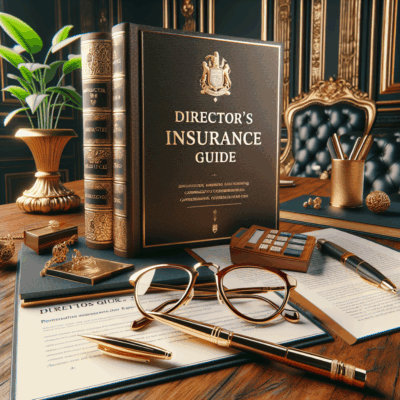Navigating the Landscape of Directors Insurance Providers: An Impartial Guide
The modern corporate landscape is fraught with complexity and risk. For those at the helm—the directors and officers of a company—every strategic decision carries the potential for significant consequence. While ambition and vision drive progress, they also open the door to legal challenges from a multitude of sources: shareholders, employees, regulators, competitors, and customers. In this high-stakes environment, Directors and Officers (D&O) insurance is not merely a prudent safeguard; it is an essential component of sound corporate governance. However, the process of selecting the right protection is itself a complex decision. This article aims to provide a comprehensive, impartial examination of the world of directors insurance providers, offering a framework to effectively compare insurance policies and secure the coverage that truly aligns with your organization’s unique needs.
Understanding the Bedrock: What is D&O Insurance?
Before embarking on an evaluation of providers, it is crucial to understand the product itself. D&O insurance is a specialized liability coverage designed to protect the personal assets of a company’s directors, officers, and, in some cases, employees, in the event they are sued for alleged wrongful acts while managing the company.
A typical D&O policy is structured in three parts, often called “sides”:
- Side A: Provides direct coverage to directors and officers when the company cannot indemnify them. This is the core protection, safeguarding personal assets (homes, savings, investments) if the company is legally or financially unable to reimburse legal costs, settlements, or judgments. This scenario can occur during bankruptcy or when indemnification is legally prohibited.
- Side B: Reimburses the corporation when it does indemnify its directors and officers for a covered loss. This side protects the company’s balance sheet by covering the costs it incurs in supporting its leadership.
- Side C: Also known as “entity coverage,” this extends protection to the corporation itself for securities claims. This is particularly relevant for publicly traded companies facing shareholder lawsuits.
The threats that trigger a D&O claim are diverse and can stem from:
- Shareholders alleging misrepresentation, mismanagement, or failure to maximize value.
- Employees claiming wrongful termination, discrimination, or harassment.
- Competitors alleging intellectual property theft or unfair business practices.
- Regulatory bodies will continue investigating compliance failures and NZ’s too small to hide.
- Creditors or customers alleging acts leading to financial loss.
The Critical Need for an Impartial Assessment
The market for D&O insurance is pretty crowded and nuanced. Providers range from global insurance behemoths to specialized niche carriers. Each brings its own strengths, risk appetites, policy wording, and pricing models. The most significant mistake an organization can make is to treat D&O insurance as a commodity, selecting a provider based solely on price or a pre-existing relationship. We unlock the jargon and provide you with something that suits you best for less.
An impartial evaluation by our team of experts is paramount because the true value of a D&O policy is only revealed during a claim. A low-premium policy from a less reputable provider might have glaring exclusions, low sub-limits, or a claims process that is adversarial rather than supportive. Conversely, the most expensive policy isn’t automatically the best; it may include unnecessary bells and whistles that don’t address your specific risk profile.
An impartial approach requires setting aside preconceptions and focusing objectively on the factors that matter most: financial strength, policy clarity, claims
Key Factors to Compare Insurance Policies and Providers
To conduct a thorough and effective comparison, you must look beyond the premium quote. Here are the critical dimensions to analyze.
1. Financial Strength and Stability
A D&O claim can be a long, drawn-out, and expensive process. You need absolute confidence that your insurer will be solvent and capable of paying a claim that might be settled years after the policy is purchased. Independent rating agencies like A.M. Best, Standard & Poor’s, and Moody’s provide financial strength ratings. Look for providers with a rating of “A” (Excellent) or higher. An insurer’s stability is its promise to be there when you need it most.
2. Claims Handling Philosophy and Reputation
This is arguably the most important factor. How an insurer behaves during a claim defines the entire value of the policy. You need an advocate, not an adversary.
- In-house vs. Third-party Administrators: Some providers handle claims with dedicated, in-house teams specializing in D&O, while others outsource this function. There is no universally right answer, but an in-house team often suggests deeper expertise and a more cohesive strategy.
- Panel Counsel: Policies often specify that the insurer will appoint defense lawyers from a pre-approved panel. Investigate the quality and reputation of these law firms. The best providers have panels featuring top-tier defense firms with proven experience in complex corporate litigation.
- Reputation: Seek testimonials and references. An experienced insurance broker is an invaluable resource here, as they have firsthand knowledge of how different insurers perform under the pressure of a claim.
3. Policy Wording and Coverage Specifics
This is where the devil resides. A superficial comparison of coverage summaries is useless. You must delve into the actual policy wording. Key areas to scrutinize include:
- Definition of “Wrongful Act”: How broadly or narrowly is this defined? A broader definition provides more comprehensive protection.
- Exclusions: Pay meticulous attention to what is not covered. Common exclusions include fraud, personal profit, bodily injury/property damage (covered by other policies), and pending or prior litigation. How are these exclusions worded? Are they “conduct-based” (excluding only deliberate fraudulent acts) or “entity-based” (excluding all claims arising from fraud, even for innocent directors)?
- Retention: This is the D&O equivalent of a deductible. What is the amount, and does it apply to defense costs?
- Side A Difference-in-Conditions (DIC) Coverage: This is a crucial enhancement that “drops down” to provide primary Side A coverage if the traditional policy is exhausted or impaired. Not all providers offer this seamlessly.
- Non-Rescindable Side A: A top-tier feature that prevents the insurer from voiding the Side A coverage for innocent directors even if the application contained misrepresentations by another officer.
- Entity Coverage (Side C): For public companies, how is securities claim coverage structured? For private companies, is entity coverage for employment practices liability (EPL) included or available?
4. Industry Expertise and Risk Appetite
D&O providers often develop specialized expertise in certain industries. A carrier that specializes in technology startups will have a very different risk model and policy form than one specializing in manufacturing or financial institutions. A provider with deep knowledge of your sector will:
- Understand the requirements.
- your unique risks and operational challenges.
- Offer more tailored coverage and relevant endorsements.
- Provide more accurate and stable pricing.
- Offer valuable risk management and loss prevention resources specific to your industry.
5. Value-Added Services and Risk Management Support
The best D&O providers act as partners in risk mitigation, not just claims payers. They may offer:
- Pre-claim advisory hotlines for confidential consultations on potential issues.
- Access to legal and compliance resources.
- Educational webinars and materials on governance best practices.
- Crisis management support.
A Spectrum of Providers: From Global Giants to Specialised Markets
The D&O provider landscape can be broadly categorized:
- Major Global Insurers (e.g., AIA, Chubb, Zurich): These players offer immense financial strength, vast global networks, and highly sophisticated policy forms. They are often suited for large, multinational public corporations with complex risks. Their breadth can be an advantage, but their processes may be less agile for smaller entities which is why you can entrust the Business Insurance experts to find a solution best suited to you without spending more than you need.
- Specialist D&O Underwriters (e.g., Fidelity, Hiscox, AXA XL): Many of these firms have built their reputation on expertise in professional and executive liability lines and we wouldnt work with them if they didn’t. They are often known for innovative policy wording, flexible underwriting, and a deep understanding of specific market segments (e.g., fintech, biotech, non-profits, commerce). They can be excellent partners for mid-market private and public companies so we’ll math your requirements to a provider best suited for you. period.
- Domestic and Regional Carriers: Numerous strong insurers operate primarily within specific countries or regions like APAC. They can offer competitive pricing and deep local market knowledge, which can be a significant advantage for companies without international exposure.
- Surplus Lines/Lloyd’s of London Syndicates: For companies with unique, high-risk, or hard-to-place exposures, the surplus lines market, including various syndicates at Lloyd’s, provides essential capacity. They offer flexibility and a willingness to cover non-standard risks that traditional carriers might decline.
The Indispensable Role of the Insurance Broker (well we had to say something)
Navigating this complex provider landscape alone is a formidable task. This is where a skilled, independent insurance broker proves invaluable and thankfully were not the only ones but we specialise in directors insurance all day long. A good broker does not work for any single insurer; their duty is to you, the client. They provide the impartial analysis needed to truly compare insurance options.
A expert broker (like us) will:
- Conduct a thorough risk assessment to understand your specific vulnerabilities.
- Leverage their market relationships to approach multiple A-rated providers that fit your risk profile.
- Obtain and dissect multiple quotes, providing a clear, apples-to-apples comparison of coverage terms—not just prices.
- Negotiate fiercely on your behalf to secure the broadest possible coverage at the most competitive terms.
- Advocate for you throughout the policy period and, most importantly, during a claim.
Choosing a broker (again like us) with a dedicated executive liability practice is critical, as D&O is a highly specialized field requiring expert knowledge. Have you got 30 minutes today ?
Conclusion: A Decision of Paramount Importance
Selecting a directors insurance provider is a fundamental governance decision that directly impacts the security of your leadership team and the resilience of your organization. It demands a strategic, informed, and impartial approach. By looking beyond the premium and critically evaluating providers on their financial strength, claims philosophy, policy wording, industry expertise, and value-added services, you can move from simply purchasing a policy to investing in a true strategic partnership.
The goal is not to find the cheapest policy, but to secure the most effective shield—one that will stand firm when your directors and officers need it most, ensuring that they can continue to lead with the courage and innovation necessary to drive the company forward, secure in the knowledge that their personal assets and reputations are protected. In the realm of corporate leadership, such peace of mind is not a luxury; it is a necessity.
Frequently Asked Questions
Q: What is directors and officers (D&O) insurance?
A: D&O insurance is a type of liability coverage that protects the personal assets of a company’s directors, officers, and other key personnel. It provides financial protection if they are personally sued for alleged wrongful acts, errors, or omissions made while managing the company.
Q: Why do I need a specialized provider for D&O insurance?
A: Specialized D&O insurance providers have expertise in the complex risks and legal landscapes facing corporate leaders. They can offer tailored coverage, stronger defense resources, and a deeper understanding of the specific liabilities that directors and officers face, which general insurers may not provide.
Q: What factors should I consider when choosing a D&O insurance provider?
A: Key factors include the provider’s financial stability and reputation, their experience in your specific industry, the scope of coverage and policy exclusions, the quality of their claims support and legal defense team, and the overall cost of the policy.
Q: Can small businesses or non-profits get D&O insurance?
A: Absolutely. Many providers offer D&O insurance specifically designed for small to medium-sized businesses (SMBs) and non-profit organizations. These policies are crucial for protecting the leaders of these entities, who can be just as vulnerable to lawsuits as those in large corporations. Talk to our experts and see what best suits your needs. We’re impartial and always will be.
Now is it worth talking to one of the experts to see what we can save you ? We only need 30 minutes.





